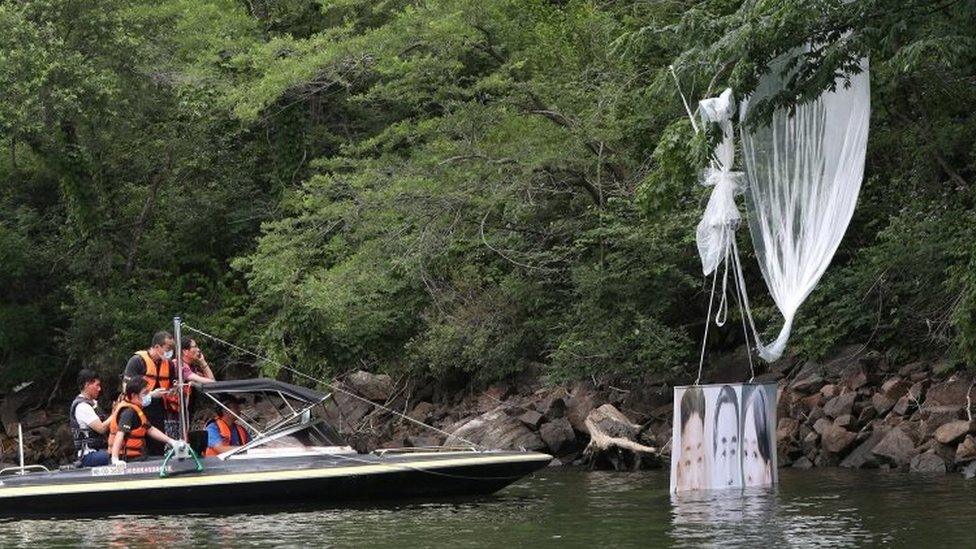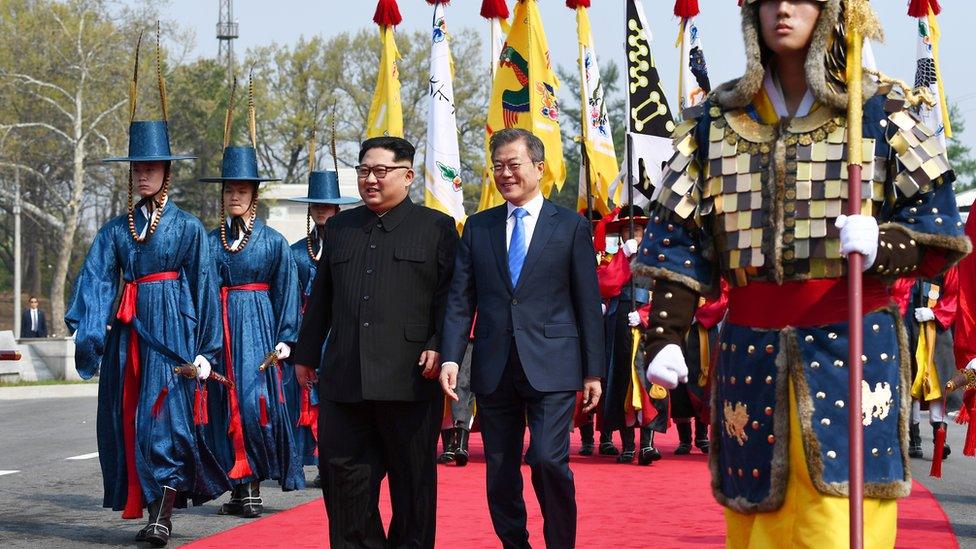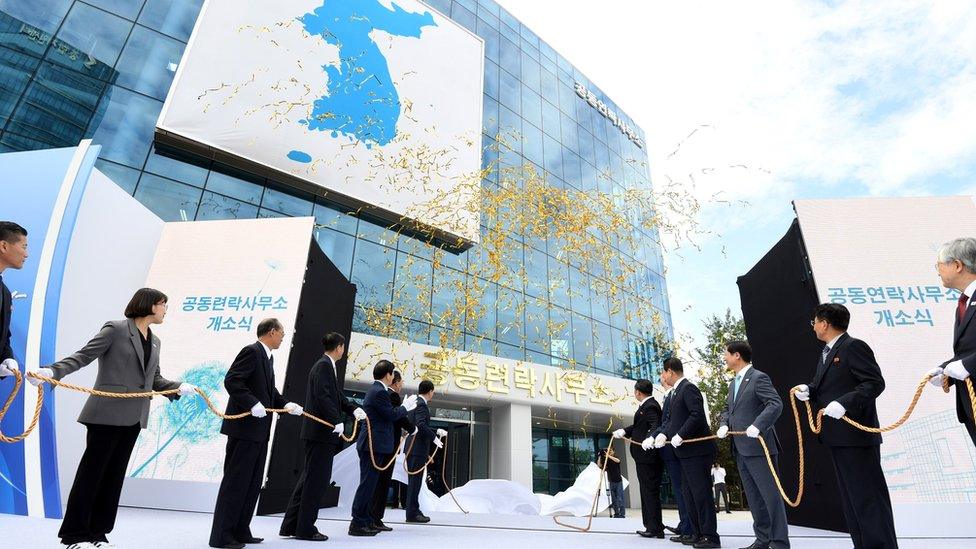North Korea: Balloons and speakers raise Korean border tensions
- Published

One of the balloons got stuck in a tree before reaching the border
South Korean activists say they have flown propaganda-carrying balloons across the border in to North Korea, the latest provocation in an escalation of tensions between the two neighbours.
The North has expressed its anger about the balloons, and the South has attempted to stop the activists.
Since a 2018 thaw, the long-standing rivals had been making efforts to improve ties and maintain dialogue.
But the relationship appeared to have deteriorated rapidly in the past week.
Last week the North blew up the Inter Korean Liaison Office, on its side of the border, which was set up two years ago to ensure regular dialogue between the two countries.
Wednesday marks the anniversary of the start of the Korean War. Analysts believe Pyongyang is intentionally ratcheting up the tension to increase its bargaining power and force new talks.
What is happening at the border?
Balloon campaigns have been going on for years - they usually carry leaflets, USB sticks or DVDs with criticism of the Pyongyang regime, as well as South Korean news reports or even Korean dramas.
All of this is aimed at breaking the North's control on domestic information with the hope that people might eventually topple the regime from within.
But South's government has always been uneasy about the balloons, arguing this results in nothing but counterproductive tensions.

Seoul has pledged to stop people from sending balloons north
Overnight, despite warnings from both the North and South, activists in the South said they had sent some balloons.
"North Koreans are deprived of human rights and enslaved by a modern dictator, do they not have a right to know the truth?," the group behind the launch said.
"Leaflets are not poison, nor do the balloons carry bombs."

Police rescued the balloon after it fell into a river on the South Korean side
At least one of the balloons, however, ended up caught in a tree south of the border.
The South Korean government on Tuesday reiterated its condemnation of the balloons, saying they should be "immediately halted to improve inter-Korean relations and promote peace on the Korean peninsula".
What is North Korea's position?
Pyongyang has in the past been described the flights as "an intolerable insult" and those sending them - often defectors from the North - as "human scum".
It has said it is preparing its own counter-propaganda material to be sent south. According to state media there are about 12 million leaflets ready to convince citizens in the South of the glory of Pyongyang.
North Korea has also begun to move speakers back to its side of the border.
These speakers had been used to blare propaganda messages south. These were removed as part of the Panmunjom Declaration in 2018. when both sides agreed to dismantle their speakers and stop other forms of cross-border propaganda.
South Korea footage of the explosion in Kaesong
Last week, the North blew up a joint liaison office with the South near the border town of Kaesong.
The North's military last week said it was ready at any time to move back into positions in a buffer zone it abandoned during the thaw.
It's about pressure, not balloons
It's unclear what exactly provoked North Korea to escalate the situation over the past week. Pyongyang's official explanation is that is angry at the cross-border propaganda and Seoul's failure to stop it.
But the balloons are nothing new, so it's hard to see why they suddenly should trigger such a a shift in mood.
"I very much doubt that it's the leaflets that actually motivated Pyongyang in this," Fyodor Tertitskiy of Kookmin University in Seoul told the BBC.

Despite a lot of talk and smiles, the North didn't achieve any concessions
"It's much more likely that they are using this incident merely as a pretext to start an escalation. The real reason is that they feel the South has not made any real concessions since the talks."
After North Korea began talks in 2018 with both the South and the US, Pyongyang had been hoping the dialogue might translate into tangible easing of sanctions and increased economic co-operation with the South.
Pyongyang's expectation had been the start of some inter-Korean projects, for instance allowing tourism to the Kumgang mountains, an idea which had been mentioned in a joint declaration by the two sides.
None of this has not happened, largely because Washington insisted on North Korea giving up its nuclear weapons before there could be any talk on sanctions.
Will the tensions continue?
"I doubt there will be any concessions from Seoul," Mr Tertitskiy says. "And that's due to pressure from Washington.
"South Korean President Moon Jae-in has shown that the alliance with the US is a priority for him and as of now, Washington would not approve any real assistance to the North."
With Pyongyang upset at the standstill but Seoul unlikely to make any substantial moves, there is little expectation the situation will calm down any time soon.
"We will likely see North Korea continuing to reinstall loudspeakers, advance troops back to the guard posts in the demilitarized zone, and maybe we will see the anti-South leaflets," Jeongmin Kim, Seoul correspondent at NK News, told the BBC.
"Seoul will be in a difficult position," she explains.
"It is facing criticism both in and outside of South Korea - trying to look like they are firmly responding to provocations and protecting its citizens but at the same time not trying to drive off North Korea too much."
- Published16 June 2020

- Published16 June 2020
